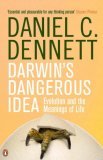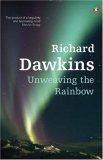 I’ve finished Daniel C. Dennett‘s “Darwin’s Dangerous Idea“, for the fourth time. Or is it the fifth? Writing this entry made me re-read the book one more time.
I’ve finished Daniel C. Dennett‘s “Darwin’s Dangerous Idea“, for the fourth time. Or is it the fifth? Writing this entry made me re-read the book one more time.
Dennett begins by saying: “Let me lay my cards on the table. If I were to give an award for the single best idea anyone ever had, I’d give it to Darwin, ahead of Newton and Einstein and everyone else. In a single stroke, the idea of evolution by natural selection unifies the realm of life, meaning and purpose with the realm of space and time, cause and effect, mechanism and physical law. But it’s not just a wonderful scientific idea. It’s a dangerous idea.”
I agree.
As a philosopher of science, Dennett first clarifies the idea, discusses some of the challenges to it, looks into the reasons for many people’s (including scientists’ and biologists’) unease with the idea and finally looks into the consequences of this idea for philosophy and morality.
So what’s the big idea, then?
Pre-Darwin, philosophers like Locke and Hume supposed that MIND was required to create DESIGN out of ORDER and ORDER out of CHAOS. Dennett calls this the Cosmic Pyramid. As William Paley asserted, if you should find a watch, look for the watchmaker who made it.
Darwin turned the whole thing on its head. As an anonymous attack on Darwin said: “In the theory with which we have to deal, Absolute Ignorance is the artificer; so that we may enunciate as the fundamental principle of the whole system that in order to make a perfect and beautiful machine, it is not requisite to know how to make it!”
Exactly.
The dangerous idea is this: we, and our minds, are the results of billions of years of mindless algorithmic processes. Dennett gives plenty of examples and explanation of what he means by algorithm.
Applying the idea
Dennett explains how this idea is applied in evolution and biology. He likens biology to engineering. We reverse engineer, we assume that each adaptation has a reason, that it made the organisms that contained the feature more fit. Sometimes, these adaptations are just accidents of history, just like in real engineering. For example, why do insects have 6 legs, while mammals have 4? Sometimes, the same adaptation will be arrived at by different species independently. For example, eyes are such a “Good Trick”, such a good answer to the environment’s questions, that they have evolved in different species independently.
These algorithmic processes are not limited to DNA and genes. Dennett goes back in time to discuss how early single-celled organisms might have evolved in to multi-cellular organisms. Or how the first amino acids got built. There is less evidence left from these early evolutions, but these hypotheses can be tested in the lab. There’s even a section on how the laws of physics might have evolved. This is the most speculative and weakest part of the book.
Looking forward, there’s the phenomenal effect of culture. Culture works a lot faster than evolution, and it keeps accelerating. Darwin’s dangerous idea can be applied to culture in the form of memes. Like the selfish genes, they ‘care’ about nothing more than their own propagation.
Attacking the idea
After all these examples of Darwin’s Dangerous Idea at work, we are confronted with the idea’s critics. We’re not talking crackpot creationists here. These are respected biologists, philologists, philosophers and mathematicians, well-known scientists like Gould and Chomsky. Dennett deals with each of their “rebuttals” or rejections of Darwinism in turn. The rebuttals are shown to be wrong or to be part of Darwinism, to the irritation of their proponents who feel as if Darwinism is a constantly moving target. On the contrary, their criticism strengthens the theory because it exposes (small) weaknesses or introduces new mechanisms, new algorithms.
The rejections are more troubling. For example, where does language come from? Is there some innate Language Acquisition Device (LAD)? Where did it come from? Did it evolve or did it suddenly appear? Where does our mind come from? All of these rejections boil down to it is currently unknown how these phenomena work, and the way they work is unknowable. I can agree with the first statement, but not the second. It’s as if these people are shouting “Don’t look behind the screen!” You never know what you might find there, but that shouldn’t stop us from looking. They reflect, as Dennett puts it metaphorically, a yearning for sky-hooks. We can lift things in two ways: we can build cranes (and cranes to build cranes which build cranes…) on solid ground; or we can hope for the appearance of hooks that hang free-floating in the sky.
The evolution of meaning, morality and ethics
Then Dennett explores meaning, morality and ethics from an evolutionary standpoint. How could they have evolved from our humble meaningless beginnings? What does it mean to “do good” or “do no evil”? Dennett looks at several theoretical models, but finds them all wanting for daily, practical use. As Dennett summarizes:
“Ethical decision-making, examined from the perspective of Darwin’s dangerous idea, holds out scant hope of our ever discovering a formula or an algorithm for doing right. But that is not an occasion for despair; we have the mind-tools we need to design and redesign ourselves, ever searching for better solutions for the problems we create for ourselves and others.”
Our daily moral and ethical dilemmas aren’t simple to solve. We have to solve them with very limited resources and time. As Dennett shows with a few effective thought experiments, the practical limits on our reasoning force us to take shortcuts and leave lots of consequence unthought-of. Lots of unintended effects can arise from the noblest of intentions. Or, as the song says: “No good deed goes unpunished”.
I can’t say “I do no evil”. The best I can promise is “I try not to do evil”.
Principles and values can help us make choices. I’m lucky, no, I choose, to work with people who live these values.
 The basic problem is that of the subtitle of the book: “Evolution and the meanings of life“. If we are the result of mindless, meaning-less algorithms, are our lives meaningless also? I don’t think so. I’m perfectly at ease in a materialistic, deterministic, existentialist world. I don’t see what indeterminism and mysticism could add. Like Dawkins argues in “Unweaving the rainbow“, our greater understanding of nature only increases my awe and respect of it.
The basic problem is that of the subtitle of the book: “Evolution and the meanings of life“. If we are the result of mindless, meaning-less algorithms, are our lives meaningless also? I don’t think so. I’m perfectly at ease in a materialistic, deterministic, existentialist world. I don’t see what indeterminism and mysticism could add. Like Dawkins argues in “Unweaving the rainbow“, our greater understanding of nature only increases my awe and respect of it.
See also:
- Some talks by Daniel Dennett at TED.
- Some talks by Richard Dawkins at TED.
- RichardDawkins.net